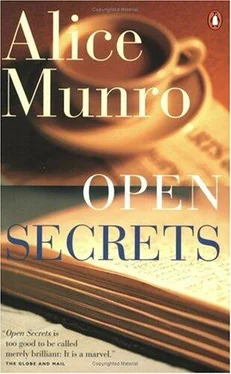“Can you imagine illustrations in modern novels?” said Charlotte, finally consenting to tie the two conversations together. “For instance, in Norman Mailer? They would have to be abstracts. Don’t you think? Sort of barbed wire and blotches?”
I went home with a headache and a feeling of jangled inadequacy. I was a prude, that was all, when it came to mixing up buying and selling with hospitality. I had perhaps behaved clumsily, I had disappointed them. And they had disappointed me. Making me wonder why I had been asked.
I was homesick for Donald, because of “Joe Hill.”
I also had a longing for Nelson, because of an expression on Charlotte’s face as I was leaving. A savoring and contented look that I knew had to do with Gjurdhi, though I hardly wanted to believe that. It made me think that after I walked downstairs and left the building and went into the street, some hot and skinny, slithery, yellowish, indecent old beast, some mangy but urgent old tiger, was going to pounce among the books and the dirty dishes and conduct a familiar rampage.
A day or so later I got a letter from Donald. He wanted a divorce, so that he could marry Helen.
I hired a clerk, a college girl, to come in for a couple of hours in the afternoon, so I could get to the bank, and do some office work. The first time Charlotte saw her she went up to the desk and patted a stack of books sitting there, ready for quick sale.
“Is this what the office managers are telling their minions to buy?” she said. The girl smiled cautiously and didn’t answer.
Charlotte was right. It was a book called Psycho-Cybernetics , about having a positive self-image.
“You were smart to hire her instead of me,” Charlotte said. “She is much niftier-looking, and she won’t shoot her mouth off and scare the customers away. She won’t have opinions .”
“There’s something I ought to tell you about that woman,” the clerk said, after Charlotte left.
That part is not of interest .
“What do you mean?” I said. But my mind had been wandering, that third afternoon in the hospital. Just at the last part of Charlotte’s story I had thought of a special-order book that hadn’t come in, on Mediterranean cruises. Also I had been thinking about the Notary Public, who had been beaten about the head the night before, in his office on Johnson Street. He was not dead but he might be blinded. Robbery? Or an act of revenge, outrage, connected with a layer of his life that I hadn’t guessed at?
Melodrama and confusion made this place seem more ordinary to me, but less within my grasp.
“Of course it is of interest,” I said. “All of it. It’s a fascinating story.”
“Fascinating,” repeated Charlotte in a mincing way. She made a face, so she looked like a baby vomiting out a spoonful of pap. Her eyes, still fixed on me, seemed to be losing color, losing their childish, bright, and self-important blue. Fretfulness was changing into disgust. An expression of vicious disgust, she showed, of unspeakable weariness — such as people might show to the mirror but hardly ever to one another. Perhaps because of the thoughts that were already in my head, it occurred to me that Charlotte might die. She might die at any moment. At this moment. Now.
She motioned at the water glass, with its crooked plastic straw. I held the glass so that she could drink, and supported her head. I could feel the heat of her scalp, a throbbing at the base of her skull. She drank thirstily, and the terrible look left her face.
She said, “Stale.”
“I think it would make an excellent movie,” I said, easing her back onto the pillows. She grabbed my wrist, then let it go.
“Where did you get the idea?” I said.
“From life,” said Charlotte indistinctly. “Wait a moment.” She turned her head away, on the pillow, as if she had to arrange something in private. Then she recovered, and she told a little more.
Charlotte did not die. At least she did not die in the hospital. When I came in rather late, the next afternoon, her bed was empty and freshly made up. The nurse who had talked to me before was trying to take the temperature of the woman tied in the chair. She laughed at the look on my face.
“Oh, no!” she said. “Not that. She checked out of here this morning. Her husband came and got her. We were transferring her to a long-term place out in Saanich, and he was supposed to be taking her there. He said he had the taxi outside. Then we get this phone call that they never showed up! They were in great spirits when they left. He brought her a pile of money, and she was throwing it up in the air. I don’t know — maybe it was only dollar bills. But we haven’t a clue where they’ve got to.”
I walked around to the apartment building on Pandora Street. I thought they might simply have gone home. They might have lost the instructions about how to get to the nursing home and not wanted to ask. They might have decided to stay together in their apartment no matter what. They might have turned on the gas.
At first I could not find the building and thought that I must be in the wrong block. But I remembered the corner store and some of the houses. The building had been changed — that was what had happened. The stucco had been painted pink; large, new windows and French doors had been put in; little balconies with wrought-iron railings had been attached. The fancy balconies had been painted white, the whole place had the air of an ice-cream parlor. No doubt it had been renovated inside as well, and the rents increased, so that people like Charlotte and Gjurdhi could have no hope of living there. I checked the names by the door, and of course theirs were gone. They must have moved out some time ago.
The change in the apartment building seemed to have some message for me. It was about vanishing. I knew that Charlotte and Gjurdhi had not actually vanished — they were somewhere, living or dead. But for me they had vanished. And because of this fact — not really because of any loss of them — I was tipped into dismay more menacing than any of the little eddies of regret that had caught me in the past year. I had lost my bearings. I had to get back to the store so my clerk could go home, but I felt as if I could as easily walk another way, just any way at all. My connection was in danger — that was all. Sometimes our connection is frayed, it is in danger, it seems almost lost. Views and streets deny knowledge of us, the air grows thin. Wouldn’t we rather have a destiny to submit to, then, something that claims us, anything, instead of such flimsy choices, arbitrary days?
I let myself slip, then, into imagining a life with Nelson. If I had done so accurately, this is how it would have gone.
He comes to Victoria. But he does not like the idea of working in the store, serving the public. He gets a job teaching at a boys’ school, a posh place where his look of lower-class toughness, his bruising manners, soon make him a favorite.
We move from the apartment at the Dardanelles to a roomy bungalow a few blocks from the sea. We marry.
But this is the beginning of a period of estrangement. I become pregnant. Nelson falls in love with the mother of a student. I fall in love with an intern I meet in the hospital during labor.
We get over all this — Nelson and I do. We have another child. We acquire friends, furniture, rituals. We go to too many parties at certain seasons of the year, and talk regularly about starting a new life, somewhere far away, where we don’t know anybody.
We become distant, close — distant, close — over and over again.
As I entered the store, I was aware of a man standing near the door, half looking in the window, half looking up the street, then looking at me. He was a short man dressed in a trenchcoat and a fedora. I had the impression of someone disguised. Jokingly disguised. He moved toward me and bumped my shoulder, and I cried out as if I had received the shock of my life, and indeed it was true that I had. For this really was Nelson, come to claim me. Or at least to accost me, and see what would happen.
Читать дальше












